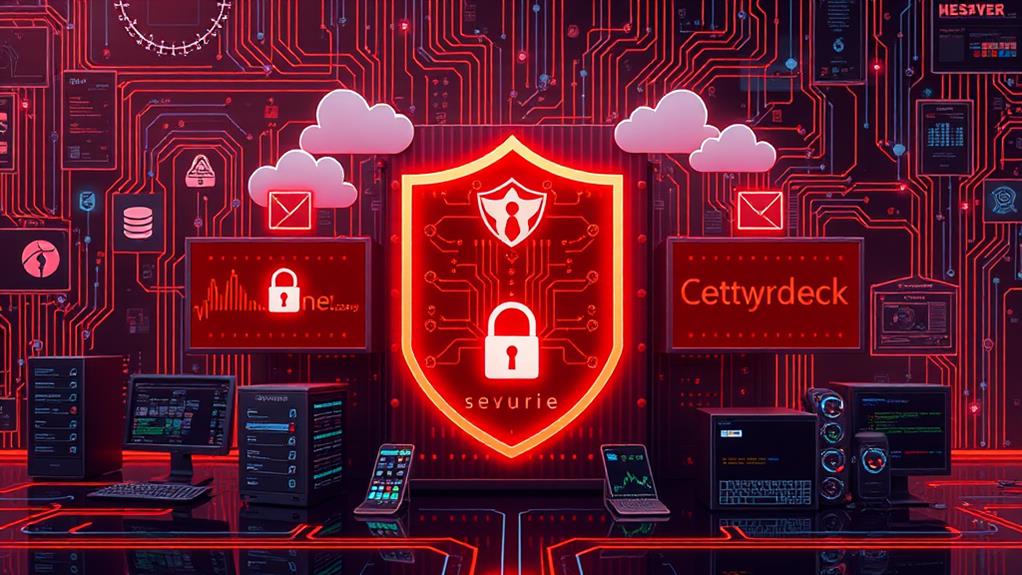The Green Web Foundation has been leading the charge in advocating for a fossil-free internet since its inception, tirelessly working towards a more sustainable digital future. By partnering with eco-conscious web hosting providers and developing innovative tools to measure and reduce carbon emissions, the foundation has set an ambitious goal to achieve a fossil-free internet by 2030. With a focus on community engagement and transparency, their efforts are not only commendable but also set a precedent for a greener online ecosystem.
Key Takeaways
- Established in 2006 to promote a fossil-free internet.
- CO2.js tool estimates emissions for web applications.
- Green Web Directory lists 442 eco-friendly hosting companies.
- Advocacy for redesigning networking protocols with environmental focus.
- Goal for a fossil-free internet by 2030 with transparency emphasis.
Environmental Impact of Web Hosting
Web hosting, a fundamental component of the digital infrastructure that powers the internet, carries a considerable environmental impact that often goes underestimated.
Servers, essential for hosting websites and storing data, account for a notable portion of global electricity consumption, impacting the industry's carbon footprint.
Enhancing server efficiency and adopting sustainable practices are imperative to mitigate these environmental consequences.
As the demand for online services continues to rise, there is a pressing need for the hosting industry to prioritize energy-efficient technologies and reduce its carbon emissions.
Green Web Foundation Initiatives
Within the domain of digital sustainability, the Green Web Foundation emerges as an essential entity dedicated to championing a fossil-free internet. Established in 2006, the foundation encourages green hosting through initiatives like the CO2.js tool, estimating emissions from web applications, and the Green Web Directory, listing 442 eco-friendly hosting companies globally.
Their fellowship program aids in climate awareness among technologists, nurturing collaborations for sustainable change. Initiatives such as the Green Checking Initiative raise awareness and offer resources for organizations to adopt sustainable hosting practices, vital in reducing carbon emissions from the internet.
Through these tools and programs, the Green Web Foundation plays a significant role in advancing sustainable hosting practices to mitigate the environmental impact of web services.
Transitioning to a Green Internet
Emerging as a vital force in the realm of digital sustainability, the Green Web Foundation has set forth a resolute mission towards championing a fossil-free internet.
Shifting to a Green Internet involves implementing carbon offsetting strategies and embracing eco-friendly technologies. The foundation's initiatives, like the CO2.js tool and Green Web Directory, aid in evaluating and promoting green hosting providers worldwide.
As the goal to achieve a fossil-free internet by 2030 gains traction, prioritizing transparency and data accessibility remains essential. Federal initiatives promoting affordable green power options and ongoing projects focusing on automating sustainability tracking signify a collective effort towards a greener digital environment.
The foundation's commitment to reliable data and transparency reinforces the importance of sustainable practices in web hosting.
Future Goals and Community Engagement
With a steadfast focus on advancing the sustainability of digital infrastructure, the Green Web Foundation is propelling towards a future marked by ambitious goals and robust community engagement.
The foundation aims to drive the adoption of sustainable technology practices, promoting digital responsibility across the web hosting industry. Its future objectives include enhancing tools like the Carbon.txt Project to automate green energy usage checks and develop directories for technology supply chain awareness.
Engaging with the Internet Engineering Task Force in workshops, the foundation highlights carbon goals and advocates for networking protocol redesigns with environmental considerations.
Through social media outreach and direct inquiries, the Green Web Foundation nurtures a community exceeding 20 million users, offering knowledge and advice to propel the shift towards a fossil-free internet.
Commitment to Reliable Data
Continuing its dedication to advancing sustainability within the digital environment, the Green Web Foundation upholds a steadfast commitment to ensuring the reliability of data concerning web hosting offers.
With a focus on data verification and transparency standards, the foundation endeavors to maintain integrity in the information it provides to users.
To achieve this goal, they employ several key practices:
- Regular audits of data sources to confirm accuracy.
- Collaborations with industry experts to validate sustainability claims.
- Implementation of transparent methodologies for data collection and reporting.
- Encouragement of user feedback to improve data quality and relevance.
Sustainability Tracking and Reporting
Pioneering the domain of sustainability within the digital environment, the Green Web Foundation sets a robust foundation for the meticulous tracking and thorough reporting of environmental impacts associated with web hosting.
By incorporating sustainability metrics and evaluating the carbon footprint, the foundation enables users to make informed decisions regarding their web hosting choices.
Through initiatives like the CO2.js tool and the Green Web Directory, users can estimate and compare the environmental consequences of different hosting providers.
This emphasis on sustainability tracking and reporting not only raises awareness of the industry's carbon footprint but also drives the adoption of greener practices.
The Green Web Foundation's commitment to transparency and data accessibility plays a crucial role in advancing the shift towards a more sustainable internet.
Community Engagement and Support
Playing an essential role in promoting sustainability within the digital environment, the Green Web Foundation actively engages with a diverse community to advocate for a greener internet.
Through various community initiatives and digital advocacy efforts, the foundation encourages support for sustainable practices in web hosting.
Community Engagement and Support:
- Interactive Workshops: Engaging with the Internet Engineering Task Force to set carbon goals and redesign networking protocols for environmental considerations.
- Direct Inquiries: Providing perspectives and advice to a user base exceeding 20 million through social media and direct communication.
- Green Technology Directory: Developing a directory to raise awareness of technology supply chains, highlighting green and non-green components.
- Carbon.txt Project: Automating green energy usage checks for organizations to streamline sustainability verification processes.
Frequently Asked Questions
How Can Individuals Reduce Their Personal Carbon Footprint in Web Usage?
To decrease personal carbon footprint in web usage, individuals should adopt sustainable personal practices and modify digital habits. Utilize energy-saving settings, limit streaming, delete unnecessary emails, and support green hosting providers for a more environmentally conscious online presence.
What Are the Challenges in Transitioning All Web Hosting to Green Providers?
Shifting all web hosting to green providers faces cost consequences, technology limitations, consumer awareness gaps, and regulatory hurdles. Balancing environmental goals with economic viability requires collaborative efforts to drive sustainable practices in the hosting industry.
Are There Certifications for Green Web Hosting Providers?
Certifications for green web hosting providers include stringent certification criteria evaluating eco-friendly practices. These certifications verify compliance with sustainability standards, renewable energy usage, carbon offsetting, and overall environmental impact reduction, ensuring transparent and accountable hosting services.
How Do Networking Protocols Impact the Environmental Footprint of the Internet?
Networking protocols influence the internet's environmental footprint by enhancing network efficiency and data optimization. Efficient protocols can reduce energy consumption in data transmission, contributing to a greener digital environment. Prioritizing sustainable protocols is key to mitigating environmental impact.
Can Businesses Receive Incentives for Transitioning to Green Web Hosting?
Businesses shifting to green web hosting can receive financial incentives through tax credits, grants, or reduced energy costs. Embracing sustainable practices not only reduces carbon footprint but also aligns with corporate social responsibility goals, promoting long-term environmental benefits.







